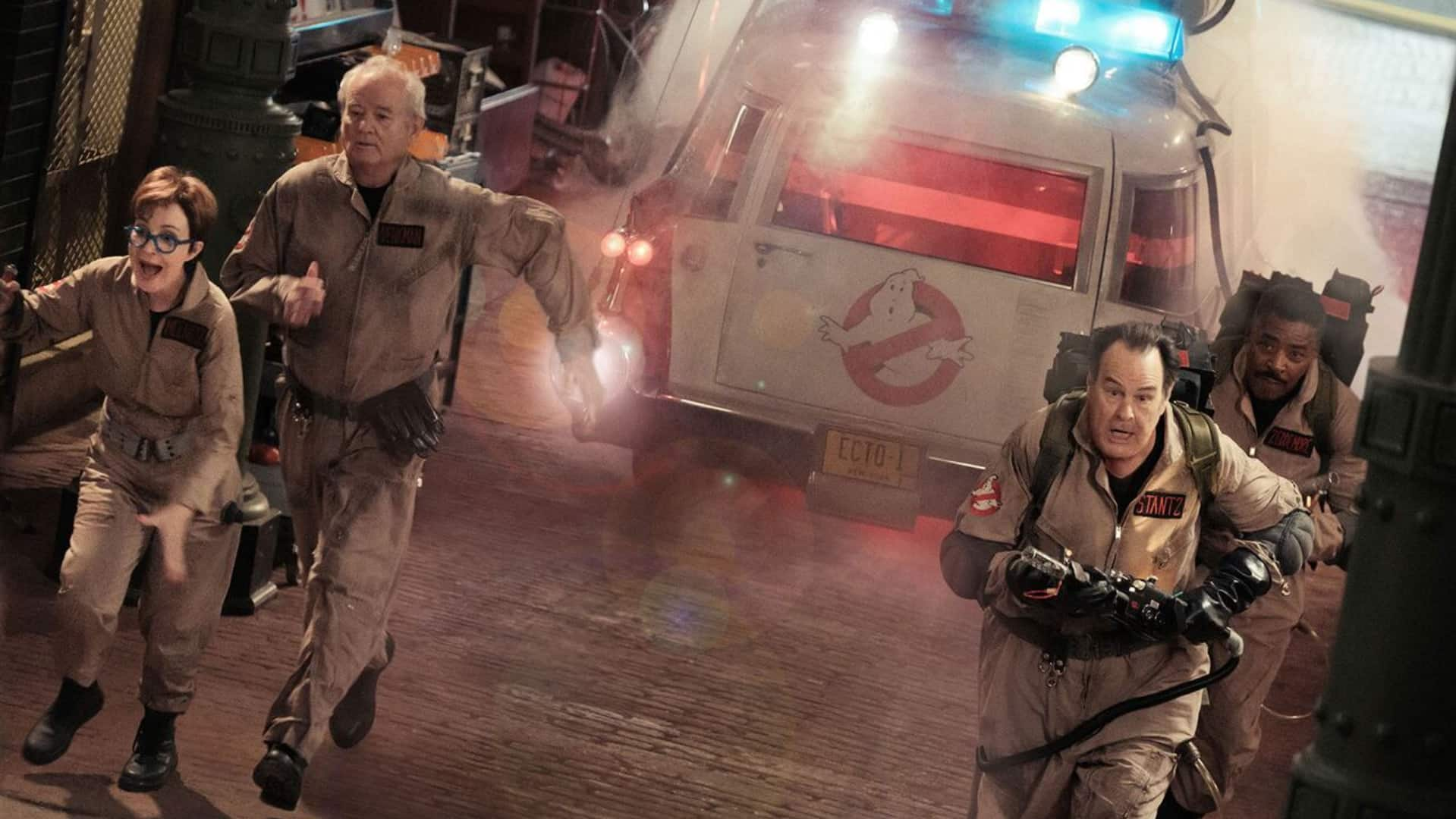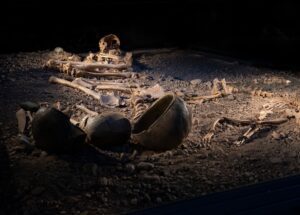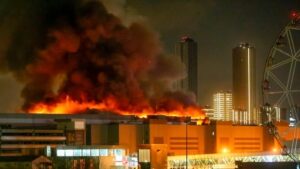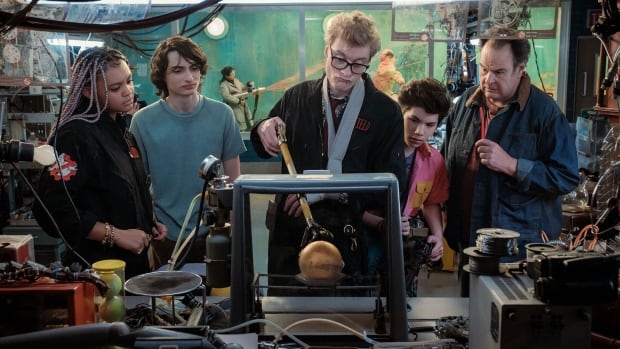
There is a scene at the end of Ghostbusters: Frozen Empire that is, for the most part, exactly the same as every Ghostbusters finale. But where the 1984 original concluded with only four ‘busters in a late-night faceoff with the glowing-eyed final ghost-boss, Ghostbusters II and the ill-fated 2016 reboot upped the total to five, while the 2021 revival, Ghostbusters: Afterlife, topped out at eight.
In returning to the world of big city ghosts and the blue-collar workers who trap them, Frozen Empire bumps the squad up to a plot-burdening 11 people busting ghosts. They are spread out into three groups, all with their own backstories, arcs and requisite callback bits to previous movies. (Not to mention a 12th, played by comedian James Acaster, passed out in the attic.)
While counting the number of ’80s haircuts sprinkled with ectoplasm may not sound like the most insightful way to judge a film, it absolutely is for Ghostbusters: Frozen Empire. That’s because nostalgia-inducing actors and set pieces are the central draw, and central purpose, for all Ghostbusters sequels.
From its inception, Ghostbusters was more a theme ride than anything else. It’s something co-writer and co-star Harold Ramis himself identified when he tried to get a third Ghostbusters sequel off the ground in 2005, the fact that “what works so well about the first two [films] is the mundane-ness of it all.”
WATCH | Ghostbusters: Frozen Empire trailer:
Because, as critic Patrick Willems pointed out in his video essay on the original film, “every movie is about something — except for Ghostbusters. It’s perfect, but it’s not about anything.” The characters of Ghostbusters do not grow or change over its duration. There is no real narrative theme or message underneath its plot, and everyone in Ghostbusters is the same person with the same values at the close as at the beginning.
Though that worked wonders for the original, leading to a sort of A-Team romp of sideshow ghost-busting and guys being dudes, it offers virtually zero fodder for re-creation.
Frozen Empire drags along the exact same cast of characters (while tacking on a few extras) as its predecessor, Afterlife. Back in the iconic New York firehouse, we once again follow the descendants of the original’s Egon Spengler (Ramis): there’s mother, Callie (Carrie Coon), older brother Trevor (Finn Wolfhard) and sort-of father figure Gary (Paul Rudd) operating as nouveau ghostbusters. And vaguely at the centre is 15-year-old Phoebe (Mckenna Grace), anchoring a busy sequel that positions itself like something of a reunion tour.
With this follow-up, the three surviving ghostbusters (Bill Murray, Ernie Hudson and Dan Aykroyd) have made comebacks or cameos in all four sequels, while spectral mainstays Stay Puft and Slimer have each only missed a single one.
Frozen Empire even makes pains to reintroduce William Atherton as Walter Peck, decades after he portrayed an antagonist so reviled that, according to director Ivan Reitman in the original film’s DVD commentary, people in bars would pick fights and passing children would scream insults at him.
The fifth installment in the live-action Ghostbusters franchise is contrived, formulaic and overburdened with characters and callbacks to the 1984 original — but, surprisingly, it’s still fun.
But as Frozen Empire juggles Phoebe’s search for independence and romance, Rudd’s awkward forays into fatherhood, Wolfhard’s tentative steps into adulthood and an overarching plot that somewhat hamfistedly combines storylines of releasing an ancient evil (à la The Mummy Returns) with Earth freezing over (hi there, The Day After Tomorrow), things quickly start to stumble.Nostalgia-bait
While Ghostbusters showcased the charisma of its leads and creative, quirkily horrifying fun of its world, every sequel is forced to prop itself up as a way to reframe the same gags and characters in an exercise in diminishing returns.
So as Frozen Empire does so for the fourth time, it is overburdened by the lore and jokes it’s forced to point back to, and the rogue’s gallery of new characters it’s been forced to pick up. But even with the Marvel Cinematic Universe or Game of Thrones-like story splintering that’s required to follow them all, it’s accomplished with a sense of style.
Like Afterlife, Frozen Empire was written by original producer/director Ivan Reitman’s son Jason. And like the original Ghostbusters, Jason Reitman understood the dual tone that makes the franchise work. One aspect is an unashamed adherence to formulaic-but-fun storytelling and character archetypes, which gives film a genuine and warm VHS-blockbuster vibe. Early on, Atherton even has a line about reducing “that firehouse you call a home… to a pile of bricks.” It’s so campily villainous it reads as if it was pulled straight out of an ’80s movie about a rich developer buying out the local teens’ ski mountain.
The other aspect is the unique mix of pessimistic horror and off-the-cuff comedy that gave Ghostbusters its unique voice. Though the visuals of a tiny Stay Puft marshmallow man giggling as its arm is shredded in a pencil sharpener might resemble Despicable Me‘s minions or Harry Potter‘s Dobby in how sickeningly obvious the cuteness has been boardroom engineered, it’s something you won’t find in any other film.
Elsewhere that comedy is found in the performance of its stars — most impressively Kumail Nanjiani as the hilarious chronic underachiever Nadeem Razmaadi, and far less so with the disappointingly underutilized (and attic-trapped) Acaster.
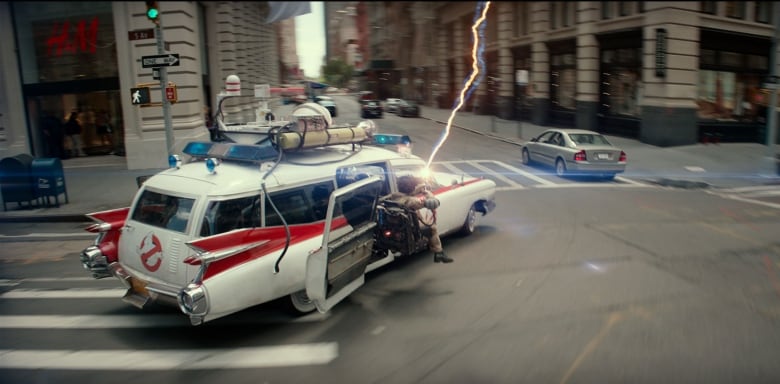
But Frozen Empire turns its lemons into lemonade with those arcs — which, coincidentally, help distract from the fact that there are no ideas left to mine in the Ghostbusters franchise. And though they might be simplistic gains, Frozen Empire does well to make sure its characters develop. Even Aykroyd’s Ray Stantz is given a lesson to learn, while Ernie Hudson’s Winston Zeddemore is given the mostly offscreen development from an out-of-work hanger-on into an obscenely rich parascience patron.
It’s far from perfect — and functions better as a kids movie than the slightly-more-adult comedy of the original. But as Bill Murray stumbles into the firehall for his obligatory cameo, punches a nondescript wall panel to reveal a hidden liquor bottle, it becomes more obvious that he is the last character to have undergone no changes and learned zero lessons — and how much the franchise has been forced to change to put out another movie at all.
